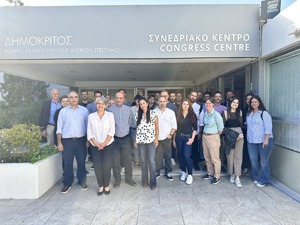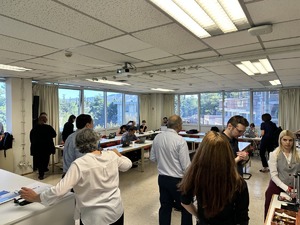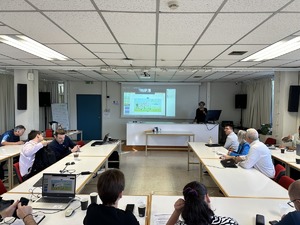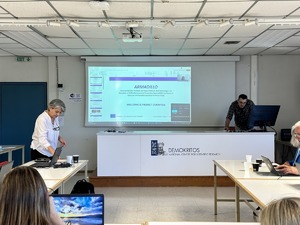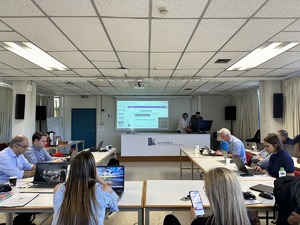SPOTKANIE OTWIERAJĄCE PROJEKT ARMADILLO
W dniach 3-4.10.2024 r. w Atenach odbyło się spotkanie inauguracyjne projektu ,,ARMADILLO - Accurate Reliable Portable and Rapid Methods And Technologies for DetectIon of GHB Substances and Prevention Against Different Forms of VioLence and AssauLt SuppOrted by These Drugs”, w którym udział wzięli przedstawiciele 17 instytucji wchodzących w skład międzynarodowego konsorcjum, w tym przedstawiciele Policji: z Polski, Mołdawii, Hiszpanii, Ministerstwa Spraw Wewnętrznych z Finlandii, podmiotów badawczych i technologicznych z Luksemburga, Niemiec, Grecji, Holandii, Rumunii oraz instytucji edukacyjnych ze Słowenii i Grecji.
Spotkanie odbyło się w siedzibie organizatora i koordynatora projektu – Narodowego Centrum Badań Naukowych „DEMOKRITOS”, a z ramienia Komendy Wojewódzkiej Policji zs. w Radomiu udział wzięli Zastępca Naczelnika Laboratorium Kryminalistycznego podinsp. dr Artur Bac oraz przedstawicielki z Pracowni Badań Chemicznych – mgr inż. Aneta Wnukowska i mgr inż. Aleksandra Wolak.
Spotkanie otworzyła dr Panagiota Petrou – koordynator projektu oraz dyrektor greckiego Narodowego Centrum Badań Naukowych „Demokritos”, która powitała uczestników, omówiła najważniejsze informacje o projekcie ARMADILLO oraz zadania na jakie został podzielony. Następnie każdy z partnerów na podstawie przygotowanych wcześniej krótkich prezentacji przedstawił swoją organizację, zakres jej działania oraz osoby, które będą zaangażowane w działania projektowe. Podczas spotkania liderzy poszczególnych pakietów roboczych omawiali zagadnienia jakie będą realizowane na poszczególnych etapach przedsięwzięcia oraz oczekiwane rezultaty. Ponadto poruszane były zagadnienia prawne i etyczne warunkujące możliwość wprowadzenia do użycia projektowanego urządzenia oraz aspekty finansowe dotyczące rozliczania i monitoringu prawidłowej realizacji projektu.
Celem przedsięwzięcia jest wyposażenie organów ścigania, w szczególności policję i instytuty kryminalistyczne w całościowy, przełomowy i łatwy w użyciu przenośny zestaw narzędzi z oprogramowaniem, który szybko wykrywa stężenie GHB - substancji wykorzystywanej w przestępstwach na tle seksualnym tzw. „tabletki gwałtu” między innymi w napojach i ślinie. Projekt będzie traktował priorytetowo ulepszone gromadzenie i udostępnianie dowodów kryminalistycznych, kładąc nacisk na zarządzanie danymi kryminalistycznymi oraz zapewnienie interoperacyjności i dostępności danych. Jako partner w konsorcjum Komenda Wojewódzka Policji z siedzibą w Radomiu będzie liderem jednego z zadań realizowanych w ramach pilotażu – T.5.2. Pilotaż 1 – Wykrywanie GHB w płynach ustrojowych (mocz i ślina). Zadaniem przedstawicieli Laboratorium Kryminalistycznego KWP zs. w Radomiu będzie ocena dokładności, czułości i specyfiki opracowanej technologii wykrywania przy użyciu syntetycznych próbek, symulujących szeroki zakres stężeń GHB w próbkach moczu i śliny.
Projekt jest finansowany ze środków Komisji Europejskiej, w Programie Horyzont Europa w obszarze Zharmonizowane europejskie podejście kryminalistyczne do analizy narkotyków w obszarze Działań innowacyjnych, Nr umowy grantowej 101168416.
Całkowita kwota dofinansowania wynosi 4 105 150,00 €, w tym budżet dla KWP zs. w Radomiu to 71 875,00 €.
Armadillo EU Project | Brussels | Facebook
Katarzyna Stankowska Zespół Funduszy Pomocowych KWP zs. w Radomiu / Anita Wnukowska Laboratorium Kryminalistyczne KWP zs. w Radomiu
THE KICK-OFF MEETING OF ARMADILLO PROJECT
On 3-4.10.2024. the kick-off meeting of the project ,,ARMADILLO - Accurate Reliable Portable and Rapid Methods And Technologies for DetectIon of GHB Substances and Prevention Against Different Forms of VioLence and AssauLt SuppOrted by These Drugs’ was held in Athens, attended by representatives of 17 institutions of the international consortium, including representatives of the Police: from Poland, Moldova, Spain, the Ministry of the Interior from Finland, research and technology entities from Luxembourg, Germany, Greece, the Netherlands, Romania and educational institutions from Slovenia and Greece.
The meeting was held at the headquarters of the organiser and coordinator of the project - the National Centre for Scientific Research ‘DEMOKRITOS’, and on behalf of the Radom Regional Police Headquarters, it was attended by the Deputy Chief of the Forensic Laboratory, Sub-Inspector Artur Bac, PhD, and representatives of the Chemical Testing Laboratory - Aneta Wnukowska, M. Eng. and Aleksandra Wolak, M. Eng.
The meeting was opened by Dr Panagiota Petrou - project coordinator and director of the Greek National Research Centre ‘Demokritos’, who welcomed the participants, discussed the most important information about the ARMADILLO project and the tasks into which it was divided. Then each partners presented their organisations, the scope of their activities and the people who will be involved in the project activities on the basis of previously prepared short presentations.
During the meeting, the leaders of the individual work packages discussed the issues to be addressed at the various stages of the project and the expected results. In addition, legal and ethical issues determining the possibility of putting the designed device into use were discussed, as well as financial aspects concerning accounting and monitoring of the correct implementation of the project.
The aim of the project is to provide law enforcement agencies, in particular the police and forensic institutes, with a comprehensive, groundbreaking and easy-to-use portable toolkit with software that can quickly detect the concentration of GHB - a substance used in sexual offences known as ‘rape pills’ - among other substances in drinks and saliva. The project will prioritise improved collection and sharing of forensic evidence, with an emphasis on managing forensic data and ensuring interoperability
and availability of data.
As a partner in the consortium, the Regional Police Headquarters in Radom will be the leader of one of the tasks carried out under the pilot - T.5.2 Pilotage 1 - Detection of GHB in body fluids (urine and saliva). The task of the representatives of the Forensic Laboratory of Regional Police Headquarters in Radom will be to assess the accuracy, sensitivity and specificity of the developed detection technology using synthetic samples simulating a wide range of GHB concentrations in urine and saliva samples.
The project is funded by the European Commission, under the Horizon Europe Programme in the area of Harmonised European Forensic Approaches to Drug Analysis in the area of Innovative Actions, Grant agreement number 101168416.
The total amount of funding is 4,105,150.00 €, including the budget for Regional Police Headquarters in Radom is 71,875.00 €.
Katarzyna Stankowska, Assistance Funds Team
